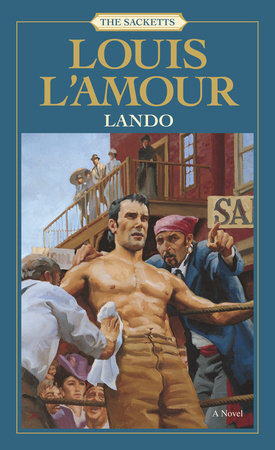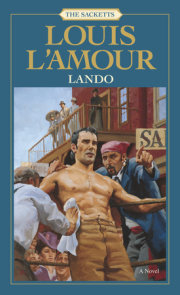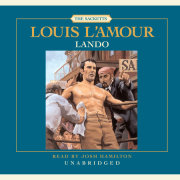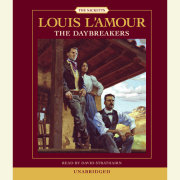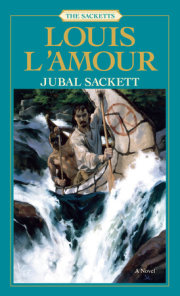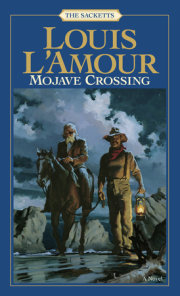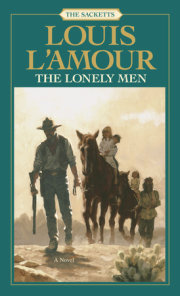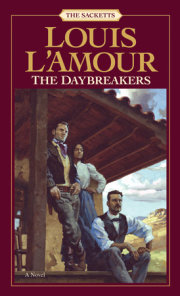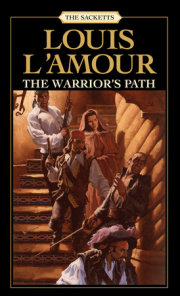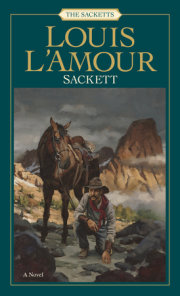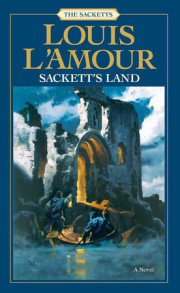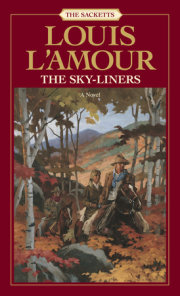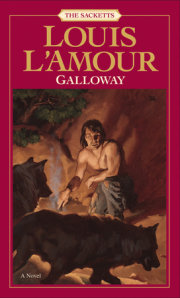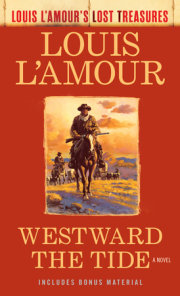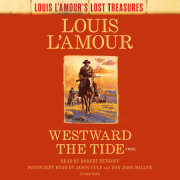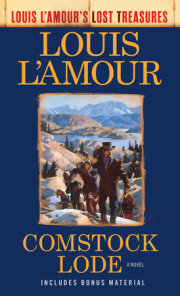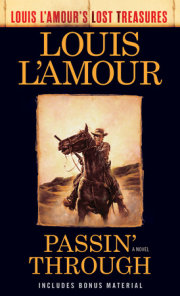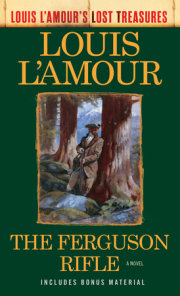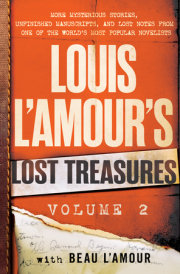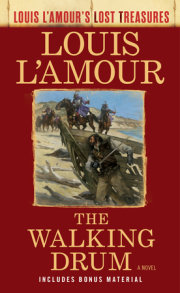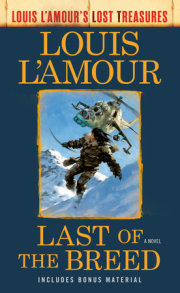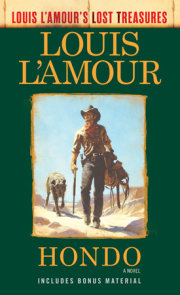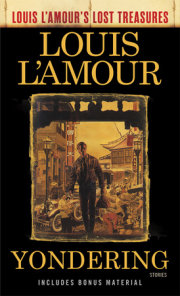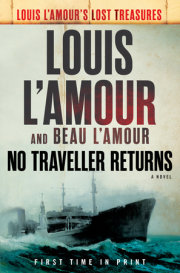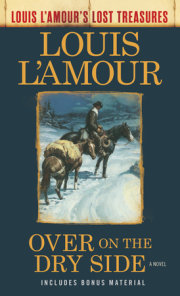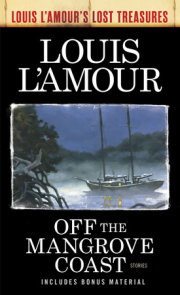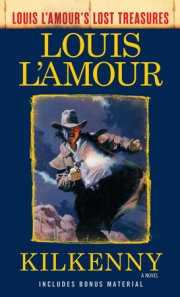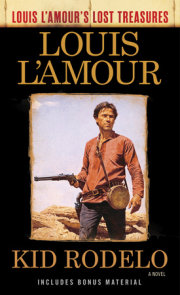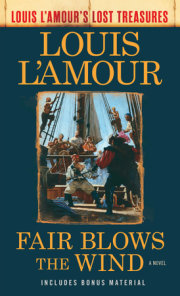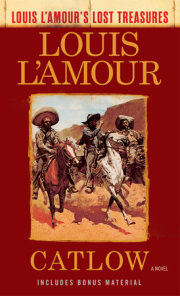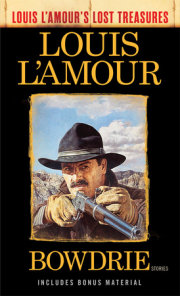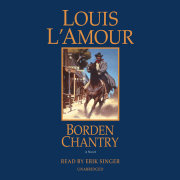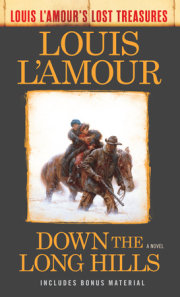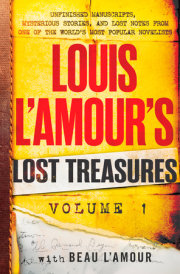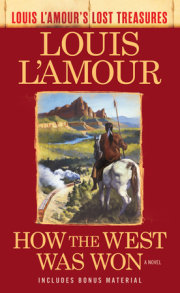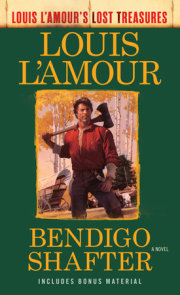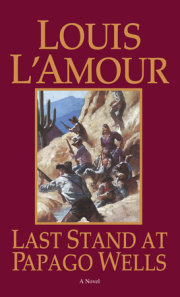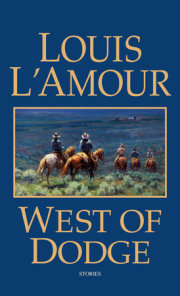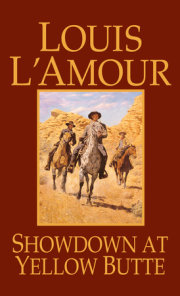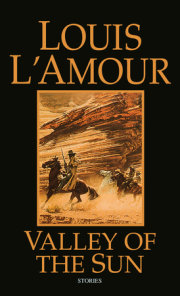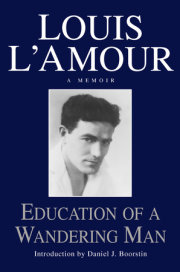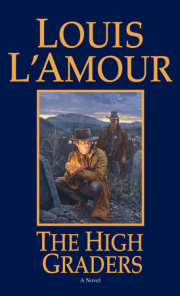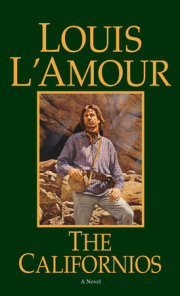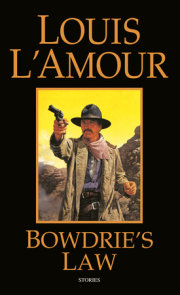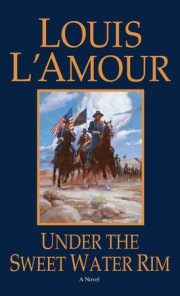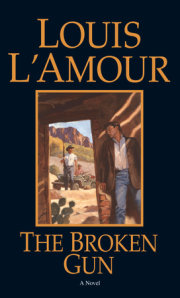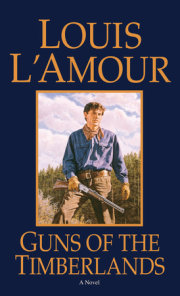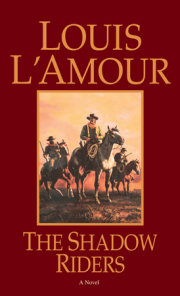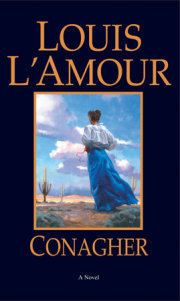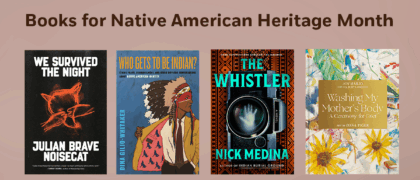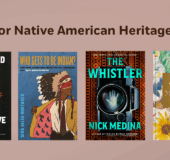Chapter One
We Sacketts were a mountain folk who ran long on boy children and gun-shooting, but not many of us were traveled men. And that was why I envied the Tinker.
When first I caught sight of him he was so far off I couldn’t make him out, so I taken my rifle and hunkered down behind the woodpile, all set to get in the first shot if it proved to be a Higgins.
Soon as I realized who it was, I turned again to tightening my mill, for I was fresh out of meal and feeling hunger.
Everybody in the mountains knew the Tinker. He was a wandering man who tinkered with everything that needed fixing. He could repair a clock, sharpen a saw, make a wagon wheel, or shoe a horse.
Fact was, he could do almost anything a body could think of that needed doing, and he wandered up and down the mountains from Virginia to Georgia just a-fixing and a-doing. Along with it, he was a pack peddler.
He carried a pack would have put a crick in a squaw’s back, and when he fetched up to my cabin he slung it down and squatted on his heels beside it.
“If you reckoned I was a Higgins,” he said, “you can put it out of mind. Your Cousin Tyrel cut his notch for the last Higgins months ago. You Sacketts done cleaned them out.”
“Not this Sackett. I never shot ’ary a Higgins, although that’s not to say I wouldn’t had they come at me.”
“Tyrel, him an’ Orrin, they taken out for the western lands. Looks to me like you’re to be the last of the Sacketts of Tennessee.”
“Maybe I will and maybe I won’t,” said I, a-working at my mill. “I’ve given thought to the western lands myself, for a man might work his life away in these mountains, and nothing to show for it in the end.”
The Tinker, he just sat there, not saying aye, yes, or no, but I could see he had something on his mind, and given time would have his say.
“You’re the one has the good life,” I said. “Always a-coming and a-going along the mountains and down to the Settlements.”
There was a yearning in me to be off the mountain, for I’d lived too long in the high-up hills, knowing every twisty creek to its farthest reaches, and every lightning-struck tree for miles.
Other than my cabin, the only places I knew were the meetinghouse down to the Crossing where folks went of a Sunday, and the schoolhouse at Clinch’s Creek where we went of a Saturday for the dancing and the fighting.
“Tinker,” I said, “I’ve been biding my time until you came along, for come sunup it is in my mind to walk away from the mountains to the western lands.”
Filling the mill’s hopper, I gave the handles a testing turn, then added, “If you’ve a mind to, I’d like you to come with me.”
Now, the Tinker was a solitary man. A long-jawed man, dark as any Indian, but of a different cast, somehow, and he’d an odd look to his yellow eyes. Some said he hailed from foreign lands, but I knew nothing of that, nor ought of the ways of foreign folk, but the Tinker knew things a body could scarcely ken, and held a canny knowledge of uncanny things.
Beside a fire of an evening his fingers worked a magic with rope or yarn, charming queer, decorative things that women took fancy to, but the likes of which none of us had ever seen.
“I have given it thought, ’Lando,” he answered me, “but I am a lone man with no liking for company.”
“So it is with me. But now it is in my mind to go to the western lands and there become rich with the things of this earth. You have the knack for the doing of things, and I have a knack for trade, and together we might do much that neither could do alone.”
“Aye … you have a knack for trade, all right. A time or two you even had the better of me.”
A time or two he said? Every time. And well he knew it, too, but it was not in me to bring that up.
“Except for one thing,” I said. “You never would trade me a Tinker’s knife.”
He took out his pipe and settled to smoke, and I knew it was coming, this thing he had on his mind. “You have enemies. Is that why you have chosen to leave at this time?”
It ired me that he should think so, but I held my peace, and when I spoke at last, my voice was mild.
“Will Caffrey and his son? They have reason to fear me, and not I to fear them. It was my father’s mistake to leave me with Will Caffrey to be reared by him, but pa was not himself from the grief that was on him, and in no condition for straight thinking.”
“Caffrey had a good name then,” the Tinker said, “although a hard-fisted man and close with money. Only since he became a rich man has he become overbearing.”
“And it was the gold I claimed from him at Meeting that made him rich, and none of his earning. He had it from my father to pay for my keep and education.”
“You put your mark upon his son.”
“He asked it of me. He came at me, a-swinging of his fists.”
When I had emptied the meal from the hopper, I tightened the mill and filled the hopper again, for such a mill as that of mine could grind only to a certain coarseness on the first grinding, and then the mill must be tightened and the meal reground before it was fit for the baking or for gruel.
“They are saying how you faced Will Caffrey at Meeting, and him a deacon of the church and all, and demanded he return the money your father left with him, and all the interest he had from its use.
“They tell how he flustered and would give you the lie, but all knew how five years ago you ran from his farm and have lived alone in this cabin since, and how, suddenly, after your father left Will Caffrey had money with which to buy farms and cattle.
“You’ll not be forgiven this side of the grave, not by Will Caffrey. He is a proud man and you have shamed him at Meeting.”
“The money is rightfully mine, Tinker. When he decided my father would not return, he took me from school and put me to work in the fields, and sent his son to school in my place.”
The mill was ready, and again I ground my meal, the noise allowing for no talk, but when I’d emptied the hopper I said, “If it is enemies I have, it is the Caffreys. I know of no others.”
He shot me a curious glance, which puzzled me with its content. “Not three tall, mustached men with dark hair and long faces? Three tall men as alike as peas in a pod … named Kurbishaw?”
“It was my mother’s name.”
“They are riding to kill you.”
“You saw them where?”
“In the Cherokee towns. They asked questions there.”
“The Indians are my friends. They will tell them nothing.”
“When last I saw them they had old Midah Wolf and were buying him drink.”
Midah was an old man with a love for the bottle and a memory of youth that only drink could bring back. When drunk, he was enemy to no man and would surely talk. He would be sorry after, but that would be of no help.
“The Kurbishaws are my mother’s folk. They will surely be coming for other reasons.”
“I have heard them say, ‘We have killed the wolf, now we shall kill the whelp.’ ”
They had killed the wolf? If by that they meant my father, I did not believe them. My father might have many faults, but lack of shrewdness was not one of them. As I grew older I had remembered his actions around our mountain cabin, and now I knew that he had been aware of danger, that he had lived no moment without that awareness.
Yet he had not returned … had they killed him, indeed?
“I have only my father’s worn-out rifle,” I said, “and a dislike for shooting men I do not know, nor have I any appetite for violence.”
The Tinker glanced at me shrewdly, and I wondered what went on behind those yellow eyes. Was he my friend, in truth? Had I learned this doubt of people? Was it acquired by brief but hard experience?
“If they find their way to the Crossing, Caffrey will be quick to tell them where you are.” The Tinker turned his yellow eyes straight at me. “Did you never wonder why your pa came to this lonely place with his bride? There’s a story told in the lowland towns.”
“There was trouble when he married ma. Her family objected to him.”
“Objected is a mild word. They objected so much they hired a man to kill him when his brothers-in-law decided against trying it. Your pa killed the man and then lit out for the hills so he would not have to kill her brothers and have their blood between them.
“Or so the story is told. Yet there is a whisper of something else, of something beyond pride of family. There is a tale that they hated your father for a reason before he even met your mother.”
Copyright © 2003 by Louis L'Amour. All rights reserved. No part of this excerpt may be reproduced or reprinted without permission in writing from the publisher.

